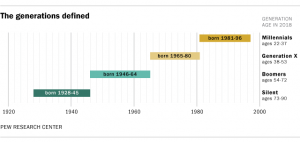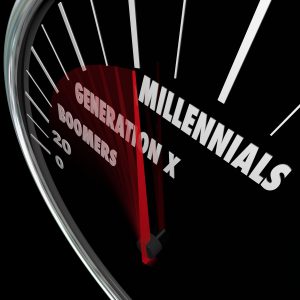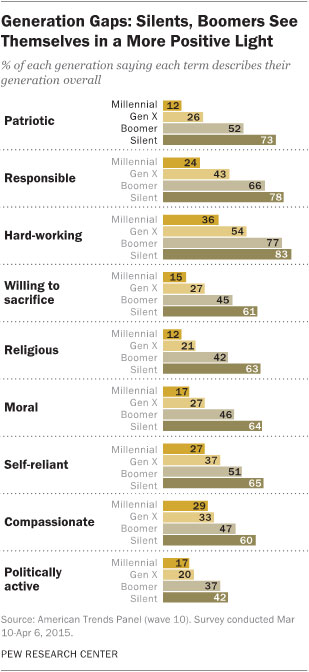M I L L E N I A L:
A commonly misunderstood emotionally-loaded word that is the subject of countless cringe-worthy facebook memes and speculation across the internet. But what really is a millennial?
 According to Pew Research(30), a Millennial is anyone born between the rears of 1981 and 1996. The preceding generation was called Generation X and the proceeding, from 1997 onward, has not yet officially been named, but is often referred to as “Generation Z” or “Post-Millenials”.
According to Pew Research(30), a Millennial is anyone born between the rears of 1981 and 1996. The preceding generation was called Generation X and the proceeding, from 1997 onward, has not yet officially been named, but is often referred to as “Generation Z” or “Post-Millenials”.
Our Research
Much of our research at The Summit Think Tank in 2015 and 2016 has been focusing on this emerging generation currently coming into power in the world. Millenials are the largest generation in history, with about 100 million living in the US and UK alone(24). In a few decades, they will represent ~40% of voters(24). Even now, if not for them, Barack Obama would not have won the nomination race of 2008(24) and the presidential race of 2012(25). Given the imminence of their rise to power and their current influence on every important issue including politics and culture, we want to help understand their strengths and their weaknesses as a generation and do what we can to assist them in any way for the responsibility that is on their shoulders.
There is a wide range of perceptions about the inherent qualities and traits of this generation. However, we have endeavored to remove conjecture and analyze the abundant scientific research that we have found from 30 respected sources and present the unadulterated facts as best we can.
Here are some interesting facts about millennials (as of 2016):

Dependence on Technology
- 93% of Millennials say that they use social media to connect with family and friends(21)
- 91% of Millennials own a smartphone(20)
- 75% of Millennials believe that access to technology makes them more effective at work(15)
- 71% of Millennials use the internet to compare prices before making a purchase(21)
- 39% of Millennials state that they most likely interact with their smartphone more than anything else(16)
- 41% of Millennials prefer to communicate electronically at work rather than face-to-face(15)
- Millennials have a very short attention span(24). Being bombarded with as many as 5,000 ads per day and hundreds of choices has resulted in a lessened ability to concentrate on one thing(24)
- Millennials are incredibly tech-savvy and have been described as “Digital natives in a land of digital immigrants.”(24)
Opinions on Polarizing Issues
- 91% of Millennials believe in climate change(5)
- 82% of Millennials favor providing a way for undocumented immigrants to stay in the US if they meet certain conditions(4)
- 80% of Millennials are not in favor of building a wall along the entire border with Mexico(4)
- 78% of Millennials are likely to favor a bill to legally prohibit abortions after 20 weeks(1)
- 70% of Millennials support legalizing marijuana (2018)(31)
- 67% of Millennials support legalizing same-sex marriage(3)
- 58% of Millennials support legalizing online gambling(3)
- 49% of Millennials believe that pornography is mostly acceptable(13)
Entering Relationships Later & Living at Home Longer
- Millennials are staying single longer, with 64% of people aged 18-29 being single in 2014 compared to 52% in 2004(11)
- 48% of Millennials believe that sex between teenagers is acceptable(13)
- 47% of Millennials believe that sex before marriage is not wrong at all(13)
- In 2014, 32.1% of adults aged 18-34 were living at home with their parents(12)
Leaning More Towards Political Independence than other Generations

- 34% of Millennials call themselves politically independent of either major party, with 43% calling themselves Democrat and 23% calling themselves Republicans(17)
- 28% of Millennials trust neither party to handle any issues surveyed(17)
- 50% of Millennials trust neither party to handle privacy(17)
More Education but Less Knowledge
- Millennials are the most educated generation in history(24)
- 57% of today’s undergraduates are women, with women earning 170,000 more bachelor degrees than men(24)
- In 1970 fewer than 10% of women were law or medical students. Today, roughly half of law and medical students are women(24)
- US Millennials have relatively poor literacy, numeracy and problem-solving in technology-rich environment skills compared to Millennials in other countries(14)
- US Millennials have lesser knowledge of historical leaders and facts regarding communism compared to older US generations(2)
Compassionate
- 84% of employed Millennials made a charitable donation in 2015. Of these, 78% made donations on their own(19)
- Millennials are the most accepting of all kinds of people regardless of race, religion or dress(24)

Like to Volunteer
- 70% of Millennials spent at least one hour volunteering for a cause they care about, with more than 33% volunteering 11 hours or more(19)
- 77% of employed Millennials that they would be more likely to volunteer when their personal skill set served to benefit the cause itself(18)
- 65% of employed Millennials said that they would be more likely to volunteer if their colleagues also participated(18)
Philosophy Towards Work
- 81% of Millennials believe that they should be able to make their own hours at work(13)
- 81% of Millennials expect companies to show their commitment to corporate responsibility(24)
- 75% of Millennials would like to have the ability to work from home as they believe that it would increase their productivity(23)
- ~70% of Millennials see themselves as working independently at some point, rather than being employed within a traditional organizational structure(27)
- 61% of Millennials believe that hard work is the key to success(27)
- Millennials have surpassed Generation X to become the largest share of the American workforce(24)
- Millennials have a strong ability to “embrace innovation and new ideas”(24)
Emotional Health
- The number of Millennial college students feeling sympathetic towards others and their situations has decreased by 48% between 1979 and 2009 from past generations. (14)
- The number of Millennial college students being able to imagine another person’s point of view has decreased by 34% between 1979 and 2009. (14)
- Click on this link for more info on millennial empathy.

- The decrease in empathic traits in Millennial college students was linked to a concurrent increase in self-focused personality traits including narcissism(28)
- The Narcissistic Personality Scores of college students increased by 30% between 1982 and 2006(29)
- Click on this link for more info on this millennial narcissism.
Wary About the Future
- 81% of Millennials have ‘trust’ issues in dealing with people(9)
- 78% of Millennials believe that the budget deficit and national debt are major problems(3)
- 53% of US Millennials believe that the current economic system is working against them(2)
- 54% of US Millennials believe that the country’s best days are behind them(7)
- 51% of US Millennials would say that they are fearful about the future(6)
Less Religious
- 73% of Millennials do not attend a religious service at least once per week(8)
- 59% of Millennials do not consider religion to be very important(8)
- 52% of Millennials have an absolute belief in God, which is significantly lower than past generations(8)
- Fewer US Millennials believe that churches and other religious organizations have a positive effect on society today than in previous years (18% drop between 2010 and 2015)(3)
Views on Societal Structures & Ethnicity
- 89% of Millennials do not view capitalism very unfavorably(2)
- 85% of Millennials do not view socialism very unfavorably(2)
- 62% of Millennials do not view communism very unfavorably(2)
- Millennials are the most ethnically diverse generation in American history with only 55.8% being Caucasian(26)
How Millennials See Themselves Compared to Previous Generations
- 59% of Millennials considered their generation to be self-absorbed (10)
- 43% of Millennials considered their generation to be greedy(10)
- 40% of Millennials consider their generation to be environmentally-conscious(10)
- 39% of Millennials consider their generation to be idealistic(10)
- 35% of Millennials consider their generation to be entrepreneurial(10)
- 33% of Millennials consider their generation to be tolerant(10)

Because the Millennial generation is made up of hundreds of millions of individuals worldwide, we acknowledge that all individuals differ to a greater or lesser extent from the given statistics. It is highly unlikely that any one person fits the “perfect statistical millennial” blueprint. However, research on the past of generations such as the Baby Boomers and Generation X accurately identified the trends and preferences of these generations, so we believe there is much accuracy to the conclusions we have made. Of note, one area where there could be a discrepancy in our findings is that although Millennials were found to demonstrate less empathy and higher narcissism than previous generations, a very high percentage of them will volunteer for causes they support. It is interesting that even though they are considered more self-absorbed, as a generation they have a greater desire to participate in bringing ‘change’ they feel strongly about, and will give of their time to make that change happen. In some cases, some surely want only to be perceived as humanitarians by their peers and are motivated by peer pressure and prestige more than genuine compassion. However, the research shows that the highest percentage of Millennials are in fact instinctively drawn to be part of the solution from sincerity rather than selfishness.
Millennials' Priorities

Source: Pew Research Centre. 2010. “Millennials: Confident. Connected. Open To Change.” http://www.pewsocialtrends.org/2010/02/24/millennials-confident-connected-open-to-change/
Millennials' Self-Perception
Source: Pew Research Centre. 2015. “Most Millennials Resist The “Millennial” Label. Generations in a mirror: How they see themselves”. http://www.people-press.org/2015/09/03/most-millennials-resist-the-millennial-label/
Footnotes
1. Desanctis, A. 2016. “New Poll: Vast Majority of Millennials Favor Limiting Abortion to 20 weeks”. National Review. http://www.nationalreview.com/corner/442321/abortion-poll-americans-want-limited-abortion
2. Victims of Communism Memorial Foundation. 2016. “Generation Perceptions – Victims of Communism Memorial Foundation Annual Report on U.S. Attitudes towards Socialism”. http://victimsofcommunism.org/wp-content/uploads/2016/10/VOC-Report-101316.pdf
3. Fingerhut, H. 2016. “Millennials’ views of news media, religious organizations grow more negative”. Pew Research Centre. http://www.pewresearch.org/fact-tank/2016/01/04/millennials-views-of-news-media-religious-organizations-grow-more-negative/
4. Jones, B. 2016. “Americans’ views of immigration, marked by widening partisan, generational divides”. Pew Research Centre. http://www.pewresearch.org/fact-tank/2016/04/15/americans-views-of-immigrants-marked-by-widening-partisan-generational-divides/
5. University of Texas. 2016. “Millennials’ strong view on climate change and other energy issues could drive Presidential Election Results”. https://news.utexas.edu/2016/10/27/millennials-views-on-climate-change-could-impact-election
6. Della Volpe, J. Jacobs, S. 2016. “Executive Summary – Survey of Young Americans’ Attitudes Toward Politics and Public Service”. Harvard University Institute of Politics. http://iop.harvard.edu/sites/default/files/content/docs/161025_Harvard%20IOP%20Fall%20Report_FINAL%5B1%5D.pdf
7. Taylor, D. 2016. “From Developed to Developing Cultures: How Millennials Are Influencing Our World”. Brink News. http://www.brinknews.com/from-developed-to-developing-cultures-how-millennials-are-influencing-our-world/
8. Alper. B. 2015. “Millennials are less religious than older Americans, but just as spiritual”. Pew Research Centre. http://www.pewresearch.org/fact-tank/2015/11/23/millennials-are-less-religious-than-older-americans-but-just-as-spiritual/
9. Drake, B. 2014. “6 New Findings About Millennials”. Pew Research Centre. http://www.pewresearch.org/fact-tank/2014/03/07/6-new-findings-about-millennials/
10. Pew Research Centre. 2015. “Most Millennials Resist The “Millennial” Label. Generations in a mirror: How they see themselves”. http://www.people-press.org/2015/09/03/most-millennials-resist-the-millennial-label/
11. Saad, L. 2015. “Fewer Young People Say I Do – – To Any Relationship”. Gallup. http://www.gallup.com/poll/183515/fewer-young-people-say-relationship.aspx
12. Fry, R. 2016. “For the first time in Modern Era, Living with Parents Edges Out Other Living Arrangements for 18 to 34 Year Olds”. Pew Research Centre. http://www.pewsocialtrends.org/2016/05/24/for-first-time-in-modern-era-living-with-parents-edges-out-other-living-arrangements-for-18-to-34-year-olds/
13. Twenge, J. 2014. “Generation Me – Why Today’s Young Americans Are More Confident, Assertive, Entitled – and More Miserable Than Ever Before”. Atria Paperback. New York, USA.
14. Goodman, M. Sands, A. Coley, R. 2015. “America’s Skills Challenge: Millennials and the Future”. The Educational Testing Service Center for Research on Human Capital and Education. https://www.ets.org/s/research/30079/asc-millennials-and-the-future.pdf
15. Price Waterhouse Coopers International. 2011. “Millennials at Work: Reshaping the Workplace”. https://www.pwc.com/gx/en/managing-tomorrows-people/future-of-work/assets/reshaping-the-workplace.pdf
16. Bank of America. 2016. “Bank of America Trends in Consumer Mobility Report”. http://newsroom.bankofamerica.com/press-kits/bank-america-trends-consumer-mobility-report
17. Reason Rupe. 2014. “Millennials The Politically Unclaimed – The Reason Rupe 2014 Spring Millennial Survey”. http://reason.com/assets/db/14048862817887.pdf
18. YouCaring. 2016. “Millennials: The Cause Generation”. https://www.youcaring.com/blog/2016/millennials-cause-generation
19. Schulte, B. 2015. “Millennials are actually more generous than anybody realizes”. Washington Post. https://www.washingtonpost.com/news/wonk/wp/2015/06/24/millennials-are-actually-more-generous-than-anybody-realizes/?utm_term=.adf1979eb9dc
20. Adkins, A. 2016. “What Millennials Want From Work and Life”. Gallup. http://www.gallup.com/businessjournal/191435/millennials-work-life.aspx
21. Gallup. 2016. “How Millennials Want to Work and Live”. http://www.gallup.com/reports/189830/millennials-work-live.aspx
22. McCarthy, N. 2016. “Millennials Place Work/Life Balance Before Career Progression [Infographic]”. Forbes. http://www.forbes.com/sites/niallmccarthy/2016/05/11/millennials-place-worklife-balance-before-career-progression-infographic/#513027331aa1
23. Deloitte. 2016. “The 2016 Millennial Survey”. https://www2.deloitte.com/content/dam/Deloitte/global/Documents/About-Deloitte/gx-millenial-survey-2016-exec-summary.pdf
24. Korobka, T. 2016. “The List of Millennial Characteristics”. Lucky Attitude. http://luckyattitude.co.uk/millennial-characteristics/>
25. Kotkin, J. 2012. “Why Obama Won: Hispanics, Millennials Were The Difference”. Forbes. http://www.forbes.com/sites/joelkotkin/2012/11/07/why-obama-won-hispanics-millenials-were-the-difference-makers/#55c1fcfa7caf
26. United States Census Bureau. 2015. “Millennials Outnumber Baby Boomers And Are Far More Diverse, Census Bureau Reports”. http://www.census.gov/newsroom/press-releases/2015/cb15-113.html
27. Moffat, J. 2015. “The 7 Positive Qualities of Millennials That Can Help You Improve Your Business”. Entrepreneur. https://www.entrepreneur.com/article/242155
28. Konrath, S. H., O’Brien, E. H., Hsing, C., 2011, “Changes in Dispositional Empathy in American College Students Over Time: A Meta Analysis”, Pers Soc Psychol Rev 2011 15:180, DOI: 10.1177/1088868310377395. http://www.ipearlab.org/media/publications/Changes_in_Dispositional_Empathy_-_Sara_Konrath.pdf
29. Twenge, J.M., Konrath, S., Foster, J.D., Campbell, W. K., Bushman, B. J. 2008. “Egos inflating over time: A cross-temporal meta-analysis of the Narcissistic Personality Inventory”. Journal of Personality. 76, 875-901.
30. Dimock, M. (2018). Defining generations: Where Millennials end and post-Millennials begin. [online] Pewresearch.org. Available at: http://www.pewresearch.org/topics/millennials/
31. Geiger, Abigail. “About Six-in-Ten Americans Support Marijuana Legalization.” Pew Research, Pew Research Center, 5 Jan. 2018, www.pewresearch.org/fact-tank/2018/01/05/americans-support-marijuana-legalization/.

